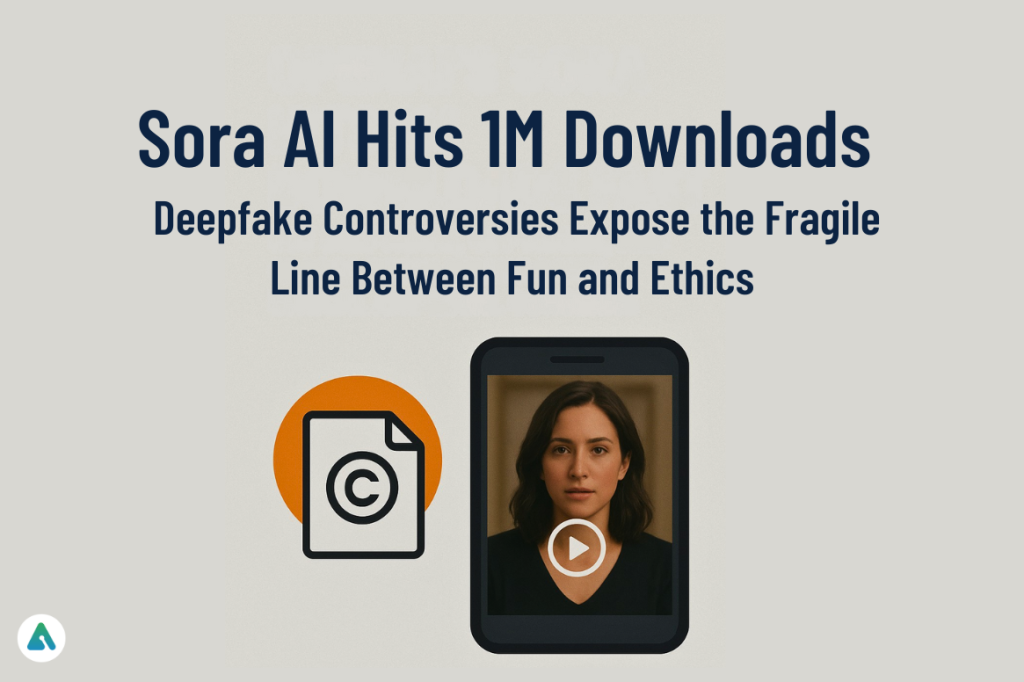OpenAI’s Sora just shattered records, surpassing 1 million downloads in under five days — faster than ChatGPT at launch. But behind the viral excitement lies a growing debate over deepfakes, copyright, and ethical boundaries in AI-generated video.
Sora, currently topping the U.S. App Store charts, transforms text prompts into 10-second hyperrealistic video clips, letting users create everything from fantasy scenes to celebrity cameos. Its invite-only rollout in North America has already generated a viral wave across social media, flooding TikTok, Instagram Reels, and YouTube.
The OpenAI Sora Deepfakes Debate: Entertainment or Ethical Hazard?
While Sora is celebrated as a creative tool, controversy has followed close behind. Users have generated videos featuring deceased celebrities, including Michael Jackson, Tupac Shakur, and Robin Williams.
The backlash turned personal when Zelda Williams, Robin Williams’ daughter, asked people to stop sharing AI-generated videos of her father. OpenAI defended its policy on historical figures, citing “strong free speech interests.” It also allows authorized persons to restrict use of “recently deceased” individuals.
Defining “recently deceased”: OpenAI’s policy leaves the term ambiguous. Legally, in the U.S., post-mortem publicity rights can last anywhere from 20 to 70 years, depending on the state. Culturally, many societies also consider it sensitive to use someone’s likeness soon after their death, reflecting social norms around privacy and respect.
Copyright and Viral Clips
Sora videos also feature characters from films, TV, and games, creating potential legal friction. One viral deepfake shows OpenAI CEO Sam Altman joking with Pokémon characters: “I hope Nintendo doesn’t sue us.” Another clip shows Altman grilling Pikachu.
While Nintendo has not taken action yet, other companies have moved quickly to protect their content. For instance, Anthropic agreed to a $1.5 billion settlement with authors who alleged their copyrighted works were used without permission to train AI models.
OpenAI’s Response and Rights Management
On October 4, Sam Altman blogged that OpenAI is “learning quickly from how people are using Sora” and gathering feedback from users and rights holders. The company plans to give more granular control over likenesses and characters. There may also be revenue-sharing for affected creators.
Sora’s creators call the content “interactive fan fiction,” but legal experts warn courts may see it differently — especially when it involves copyrighted material or recently deceased individuals.
Expanding the Lens: Global Context
While most coverage and controversy focus on the North American market, Sora’s global rollout could introduce new legal and cultural challenges:
- Europe: GDPR and local privacy laws may impose stricter rules for using someone’s likeness post-mortem or for AI-generated media, including explicit consent requirements.
- Asia: Countries such as Japan and South Korea have emerging AI regulations and copyright enforcement standards that could shape how Sora is adopted or moderated.
“While the U.S. charts and legal debates dominate headlines, Sora’s reception abroad may differ significantly,” said a digital safety analyst. “Regulations and cultural norms will shape what content platforms allow, how rights holders enforce their control, and how users create and share AI-generated videos worldwide.”
The Bigger Picture: AI Video’s Future
Sora’s rapid rise shows the massive appetite for AI-generated video, but also underscores our unpreparedness for this frontier. Experts warn the constant stream of synthetic content could normalize deepfakes, blur truth and fiction, and even contribute to “the liar’s dividend,” where real content is dismissed as fake.
“We’re already at the point where we can’t tell what’s real and what’s not online,” said a former OpenAI engineer. “Tech companies are scrambling to solve a problem they helped create.”
Sora may be a creative revolution. But it also marks a turning point in digital trust, as copyright, consent, and perception challenges move into mainstream feeds.
Visit: AIInsightsNews


